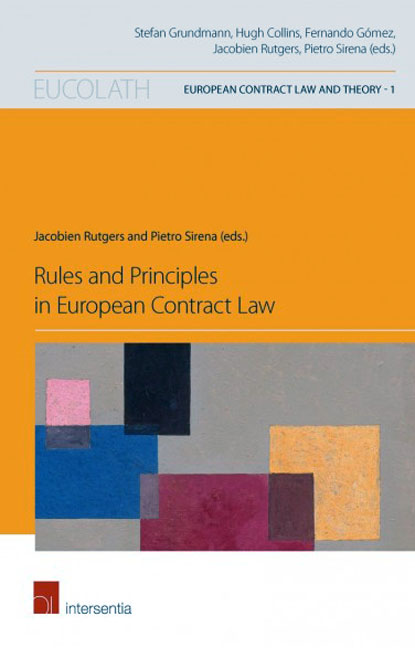Book contents
- Frontmatter
- Contents
- Table of Cases
- List of Authors
- Introduction
- Principles versus Rules in the Emerging European Contract Law
- The ECJ and General Principles Derived from the Acquis Communautaire
- The Principle of Effectiveness and EU Contract Law
- The Principle of Proportionality and European Contract Law
- ‘General Principles’ and ‘Underlying Principles’ in the Proposed Common European Sales Law and their Role in its Interpretation
- Contractual Autonomy and European Private Law
- Good Faith and Reasonableness in European Contract Law
- Benefits to the Defendant as a Measure for Relief: Toward a Specific Rule in European Contract Law?
The Principle of Proportionality and European Contract Law
Published online by Cambridge University Press: 28 November 2017
- Frontmatter
- Contents
- Table of Cases
- List of Authors
- Introduction
- Principles versus Rules in the Emerging European Contract Law
- The ECJ and General Principles Derived from the Acquis Communautaire
- The Principle of Effectiveness and EU Contract Law
- The Principle of Proportionality and European Contract Law
- ‘General Principles’ and ‘Underlying Principles’ in the Proposed Common European Sales Law and their Role in its Interpretation
- Contractual Autonomy and European Private Law
- Good Faith and Reasonableness in European Contract Law
- Benefits to the Defendant as a Measure for Relief: Toward a Specific Rule in European Contract Law?
Summary
The principle of proportionality goes to the root of the law the essence of which is the balancing of competing rights and interests. This insight is not new. The Romans already pictured their goddess of justice, Justitia, as a (blindfolded) woman with a balance. In EU law, proportionality was recognised as a general principle of law in Internationale Handelsgesellschaft.
In the relationship between the principle of proportionality and European contract law two dimensions can be distinguished. Firstly, there is the typical EU law dimension. The principle of proportionality serves as an instrument to delineate the respective powers of the EU and the Member States. As such it is used in Article 5(2) and (4) TEU which state that the Union shall act only within the limits of the competences conferred upon it by the Member States in the Treaties to attain the objectives set out therein and that, under the principle of proportionality, the content and form of Union action shall not exceed what is necessary to achieve the objectives of the Treaties. To this dimension also belongs the proportionality test used in the control of the compatibility of national legislation with the EU fundamental freedoms. The principle of proportionality evidently also fulfils these functions when legislation in the field of contract law is concerned. Proportionality in the meaning of Article 5(2) and (4) TEU is discussed whenever the EU plans to adopt legislation harmonising elements of contract law or when the desirability of a more general instrument of EU contract law (an EU code of contract law and the like) is discussed. Gysbrechts provides an example of the use of the proportionality test to determine the compatibility of national legislation on contract law with the fundamental freedoms. In this case the Court of Justice held that a Belgian rule on distance contracts, to the extent that it was interpreted as prohibiting the distance seller to require that a consumer provide his payment card number before the expiry of the withdrawal period, went beyond what is necessary to attain the pursued objective of consumer protection and constituted an obstacle to the free movement of goods contrary to Article 35 TFEU (ex-Article 29 EC).
- Type
- Chapter
- Information
- Rules and Principles in European Contract Law , pp. 69 - 98Publisher: IntersentiaPrint publication year: 2015



